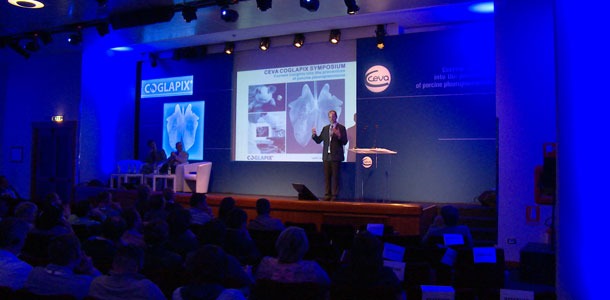
 With 90% of swine farms worldwide affected by respiratory disease and an urgent need to preserve the future of antibiotics by reducing their widespread prophylactic use, the adoption of targeted, preventative health programmes has become critical.
With 90% of swine farms worldwide affected by respiratory disease and an urgent need to preserve the future of antibiotics by reducing their widespread prophylactic use, the adoption of targeted, preventative health programmes has become critical.
Ceva Santé Animale decided some years ago that to repeat its success in producing innovative avian vaccines in the swine sector, it would have to focus and as a result chose to concentrate first on respiratory health. Following extensive in field research, the company launched the Ceva Lung Program in Asia, 15 months ago and since then has rolled out the program throughout the world, gathering valuable data through expert involvement.
Simple guidelines and an easy-to-use iPad and Android app. have made it much easier to evaluate the presence and impact of the main respiratory pathogens on farm and in the slaughterhouse and then target interventions according to the individual herd requirements.


Ceva data shows that the global prevalence of Actinobacillus pleuropneumoniae (A.p.) is very high, reaching 100% of investigated herds in some European countries. The level of pleurisy in slaughter pigs is also high, averaging 20-30% over the last decade. The economic impact of both diseases is therefore very significant, as a result of mortality (especially important when it occurs later in the fattening period) and lower performance (growth, feed conversion ratio). The presence of infections in herds can prolong time to slaughter by 5- 6 days.
Vaccines are now the method of choice for preventing bacterial diseases such as A.p. and the scientific data shows that cross serotype vaccines, such as Coglapix™, are the most effective on farms with chronic problems. Given the huge variation in the presence of serotypes and environmental conditions around the world, there is not a single, “shotgun” solution to the problem. Ceva’s pre-ESPHM seminar therefore gathered 140 attendees from 17 countries to share experiences and knowledge gained from the implementation of successful lung health programs. As well as papers from Ceva’s own veterinarians the program included presentations from the following world renowned experts:
Porcine pleuropneumonia – the need for accurate unceasing monitoring for efficient control - Prof. Paolo
Martelli, University of Parma, Italy
Evolution in the Actinobacillus pleuropneumoniae serotype distribution and its implication.
- Prof. Dan Tucker, University of Cambridge, UK
Increasing need for the efficient prevention of porcine pleuropneumonia to accomplish reduced use of antibiotics - Prof. Dominiek Maes, Ghent University, Belgium
Dr. Stefano Gozio, Head of Ceva’s Swine marketing said: “We need to create partnerships with expert
veterinarians if we are to achieve better preventative respiratory health on farms. This was the objective of
our symposium; we believe that more sharing of knowledge between professionals – producers and
veterinarians through tools such as the Ceva Lung program is the future for our industry.”
May 5, 2014 - Ceva



